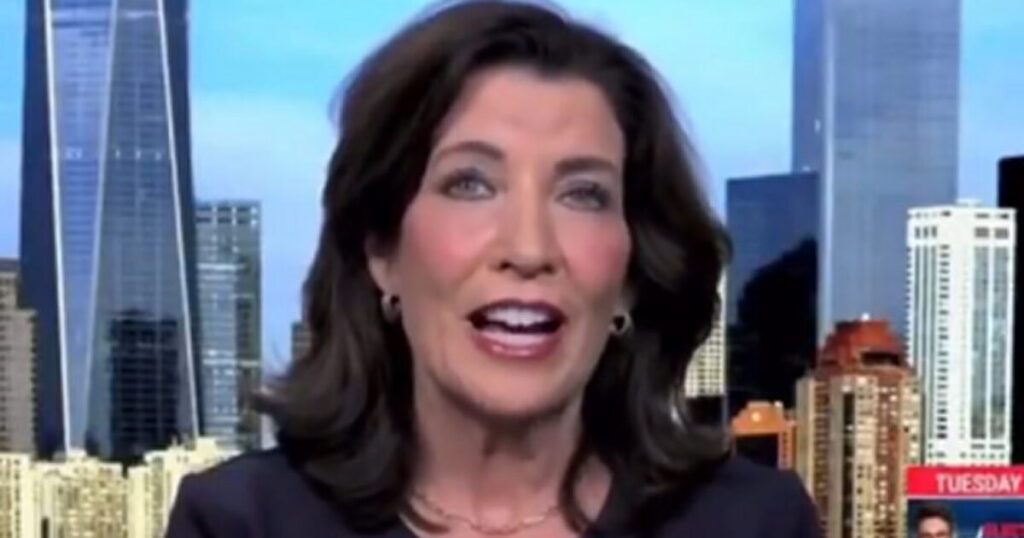In a recent appearance on MSNBC, New York Governor Kathy Hochul made controversial remarks suggesting that voting for Republicans equates to being anti-woman and anti-American. Her comments have ignited a firestorm of critique, particularly from Republican figures who argue that such incendiary rhetoric only reveals a sense of desperation among Democrats as they navigate the current election cycle. This year’s political climate has seen Democrats increasingly resorting to personal attacks against fellow citizens who express differing opinions, possibly indicative of broader insecurities about their prospects in the upcoming elections. Observers are noting that this trend of demeaning political discourse could be a sign that Democrats are aware of their waning approval, especially in a volatile election landscape.
Republican New York Congressman Lee Zeldin took to Twitter to highlight Hochul’s rhetoric, suggesting that her campaign message is fundamentally flawed and divisive. By framing opposition to the Democratic party as tantamount to supporting extreme ideologies, he argues, Hochul and the Democrats exhibit a worrying trend of politicizing basic political disagreement. Similarly, Republican Mike Lawler criticized Hochul’s leadership, calling her incoherent and pointing out her previous comments urging politically dissident New Yorkers to move to Florida. This pattern of dismissive politics seems to resonate poorly with constituents, as indicated by Hochul’s low favorability ratings, leaving many wondering about the political calculations behind such a strategy.
The backdrop of these heated political exchanges is New York’s crucial role in the upcoming elections. The New York Post notes that the state is home to seven competitive congressional races that could significantly affect the overall balance of power in Washington. Currently, Republicans hold a slim majority in the House, and the vulnerability of certain Democratic seats in New York has compounded pressures on Governor Hochul and prominent New York Democrats. Given the historical context — where Democrats lost four New York House seats in the previous elections — the stakes in the upcoming contest are particularly high. Political strategist Hank Sheinkopf emphasizes that a failure to regain control of the House would not only be damaging for local Democrats but could also be viewed as a national failure, placing blame squarely on New York’s shoulders.
Intriguingly, some Republican figures, including Congresswoman Elise Stefanik, are optimistic about the prospect of a Republican resurgence in New York. Stefanik pointed to polling data indicating that former President Trump is performing well in swing districts in New York that had previously leaned decisively Democratic. This suggests a shifting political landscape that could undermine established Democratic strongholds. Stefanik’s call for a vigorous turnout among Republican supporters signals a push to capitalize on this perceived momentum and promotes the notion that New York can indeed swing back to Republican control, changing the narrative around Hochul and local Democratic leadership.
In the broader context, the antagonistic tone adopted by Hochul and her Democratic allies emphasizes a growing polarization in American politics. As parties grapple with existential threats to their dominance in various regions, personal attacks may become the norm rather than the exception. Hochul’s rhetoric reflects an election strategy that seeks not only to unify Democrats but also to alienate those who might challenge their narrative, which could backfire and further energize Republican voters who feel marginalized. The emphasis on divisive national themes, such as women’s rights and patriotism, within this discourse may resonate with some constituents but alienate others who desire a more inclusive and collaborative political approach.
As the election approaches, the dynamics in New York serve as a microcosm of the larger national struggle between partisan extremes. The evolving landscape, marked by competitive races and shifting voter sentiments, illustrates how critical this moment is for both parties. With high stakes on the line, the strategies employed by candidates and party leaders will be vital in shaping voter engagement and turnout. Whether Hochul’s insults will unify her base or rally opposition remains to be seen, but it’s clear that New York’s role in the upcoming elections will be pivotal in determining not just congressional control but the ideological direction of the Democratic party moving forward.

